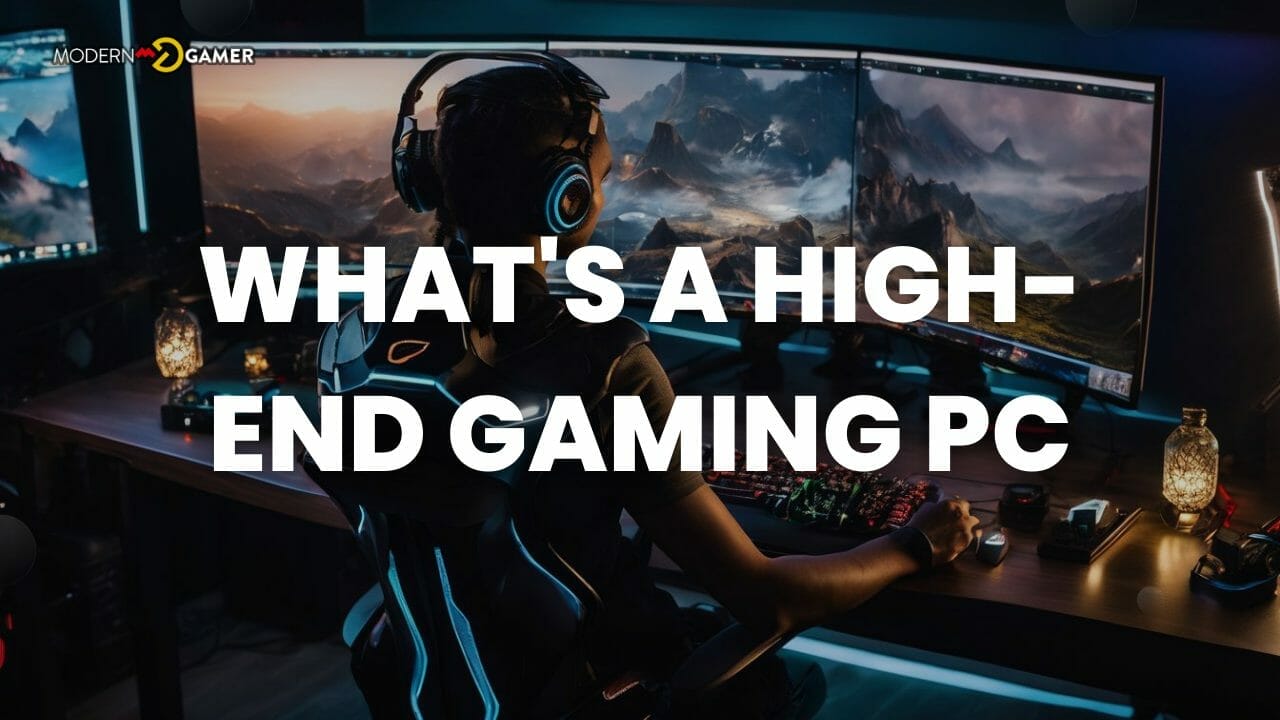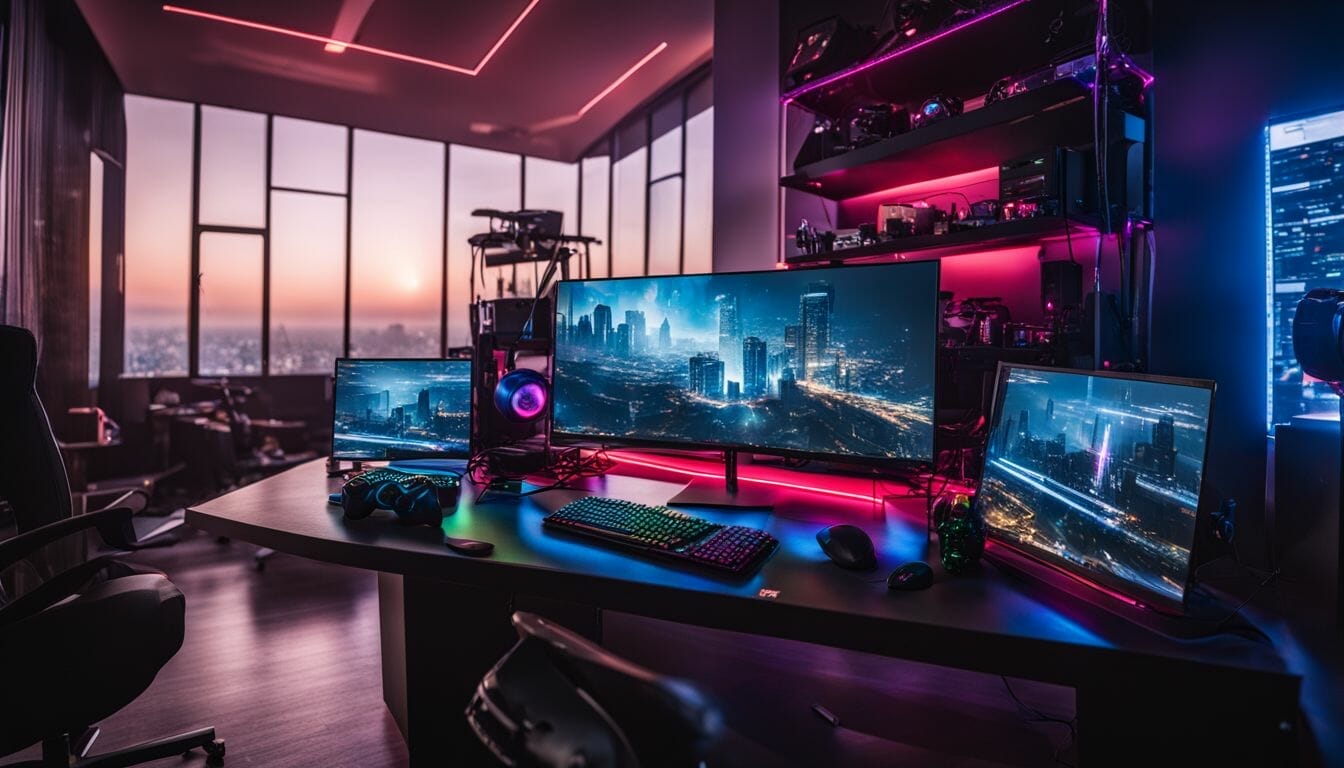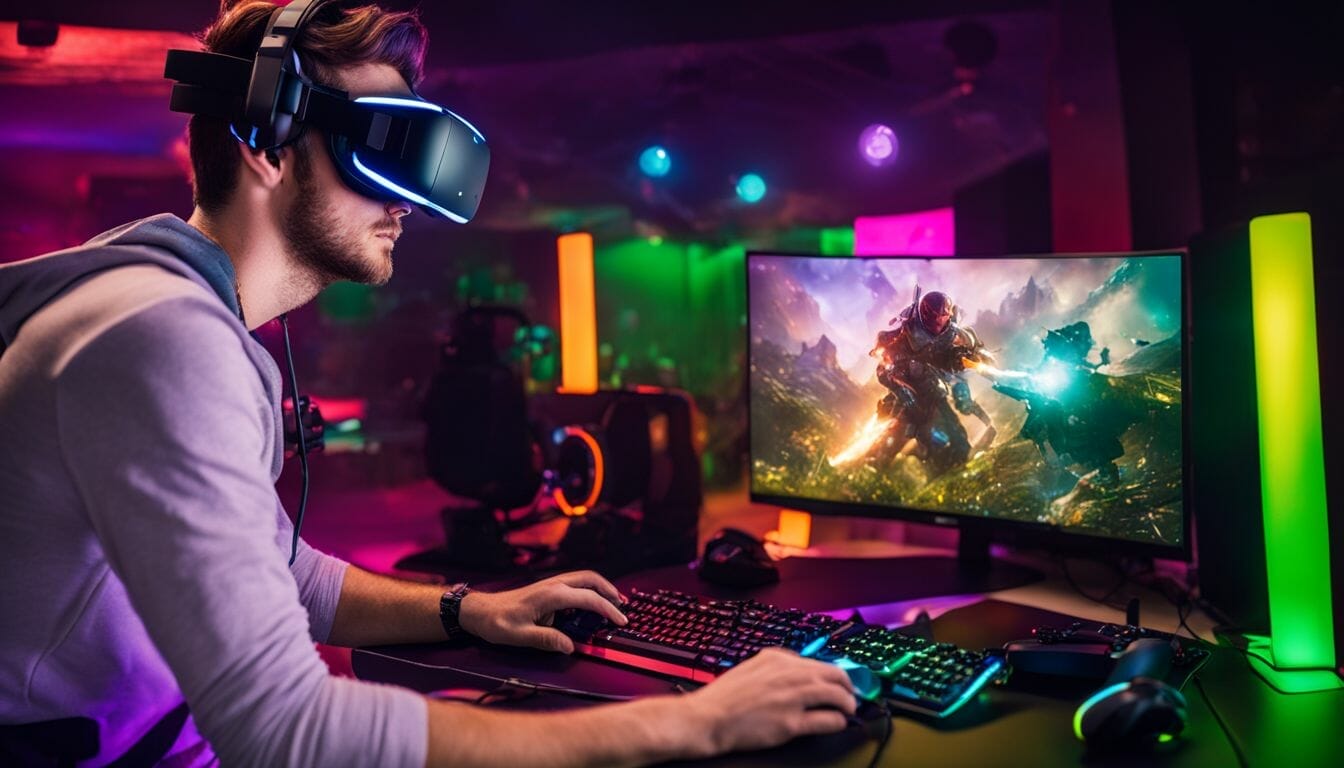Luxury Meets Performance: What’s a High-End Gaming PC

Wondering what makes a gaming PC really high-end? Many get lost in the tech talk, but here’s the scoop: prebuilt gaming PCs are hitting the sweet spot of price and power like never before. Imagine stepping into a world where your game runs smoother than a racecar on fresh pavement. The secret lies in parts that work together like a dream team—fast processors, clever cooling, and sharp graphics cards that handle every pixel with flair. Gamers who want a solid upgrade without sweating the jargon find these setups a lifesaver. Fun fact: some prebuilts pack punchy features usually seen only in custom rigs, saving tons of time and headache. Dive in to learn what really sets a top-tier gaming PC apart and how to pick one that makes every game feel like a new adventure. This info can turn your playtime from meh to mind-blowing—stick around and find out why.
Ready to unlock new realms of understanding? Let’s dive right in!
Key Takeaways
- A high-end gaming PC is a top-tier gaming machine that offers superior performance, high-quality components, and advanced cooling systems.
- Key features of a high – end gaming PC include overclocking capabilities, multiple graphics cards, high refresh rates and resolution, as well as RGB lighting.
- Benefits of owning a high-end gaming PC include an enhanced gaming experience, future-proofing capabilities for new games and technology advancements, and efficient multitasking and content creation.
- When choosing a high – end gaming PC, important considerations include budget, compatibility of components, upgradability options for future enhancements, and the reputation of the manufacturer’s customer support.
Defining a High-End Gaming PC

A high-end gaming PC is a top-tier gaming machine that offers superior performance, high-quality components, and advanced cooling systems.
Superior performance and graphics
High-end gaming PCs set the bar high in gaming. They bring top-level performance and graphics to the table. These powerful machines use high-performance video cards and a lot of core-counts.
This lets them give you amazing game play experiences. Graphics come alive with 1080p resolution or higher, thanks to strong graphics cards. A key part is the Graphics Processing Units (GPUs).
They make both 2D and 3D images look great at fast frame rates. With these PCs, games are clear, smooth, bright, and quick! You will see every detail with no trouble or slowness at all!
High-quality components
High-quality parts play a big part in a high-end gaming PC. The heart of the PC is the graphics processing unit (GPU). It’s very important and often costs a lot. Most GPUs can handle games at 1080p resolution.
Yet, for real high-end gaming, we need higher resolutions like 1440p or 4K.
Other key parts include RAM and CPU. A top-tier gaming PC needs at least 16GB of RAM to work best. Both CPU and GPU matter for great game play. But, how well your monitor shows graphics also affects your gaming fun.
Advanced cooling systems
We need to talk about the critical part that advanced cooling systems play in high-end gaming PCs. These systems keep our computers from becoming too hot when we use them for long hours.
They have GPU cooling solutions. This means they use fans inside a shroud, or cover, around the graphics processor. Most top-tier PCs come with these fans already set up.
There is also liquid cooling which does an even better job than air at making sure your PC stays cool during intense gaming sessions. It can give your computer more power, speed and lets it show better images on screen! Not all coolers are made equal though; how well a cooler works depends heavily on its design.
Some air coolers can work just as well as water ones if they’re designed right.
Key Features of High-End Gaming PCs

Key Features of High-End Gaming PCs include overclocking capabilities, multiple graphics cards, high refresh rates and resolution, as well as RGB lighting.
Overclocking capabilities
Overclocking is a cool feature that high-end gaming PCs have. It means we can increase the clock speed of our components, like the CPU and GPU, to make them work faster than they do in their regular settings.
This boosts our computer’s processing power and helps us get better frame rates when playing games or using applications that require a lot of power. With overclocking, we can keep up with the latest games and enjoy smoother gameplay.
However, it’s important to know that there are some risks involved too, such as increased power consumption and heat generation, which may affect the lifespan of our components. So we need to be careful and make sure we’re doing it right.
Multiple graphics cards
Having multiple graphics cards in a high-end gaming PC can significantly enhance your gaming experience. When you install two or more GPUs, they work together to render the same 3D images, resulting in superior graphics and smoother gameplay.
This is because the workload is divided among the video cards, allowing for faster data processing and improved performance. For gamers who enjoy multi-monitor setups, multiple graphics cards are especially beneficial, as they support multimonitor gaming with ease.
It’s worth noting that when using multiple graphics cards, technologies like SLI or Crossfire can be utilized to optimize their performance. So if you want to take your gaming visuals to the next level and enjoy stunning graphics, investing in compatible graphics cards will make a big difference.
High refresh rates and resolution
High refresh rates and high-resolution displays are key features of a high-end gaming PC. These features contribute to a more immersive and visually stunning gaming experience. With higher refresh rates, such as 144Hz or even 240Hz, the image on your screen updates faster, resulting in smoother gameplay and reduced motion blur.
This allows for quicker reaction times and enhances overall gameplay performance. Additionally, high resolution ensures sharper graphics and increased detail, bringing games to life with vibrant colors and improved visual fidelity.
So when it comes to choosing a high-end gaming PC, don’t forget to consider the display’s refresh rate and resolution for an optimal gaming immersion.
RGB lighting
RGB lighting is a key feature of high-end gaming PCs that adds a whole new level of visual immersion to your gaming experience. With RGB lighting, you can create over 16 million different color combinations using red, green, and blue.
It’s not just about aesthetics though; RGB lighting also highlights the quality of components in your gaming PC, like top-of-the-line RAM, an impressive graphics card, and a premium cooling system.
Plus, you can customize the colors of your RGB lighting on peripherals like keyboards and mice to match your personal style or gaming setup. So whether you want to create an ambient glow or make a bold statement with vibrant colors, RGB lighting allows you to personalize your gaming rig in a way that reflects your unique taste and enhances the overall look and feel of your gaming space.
Benefits of Owning a High-End Gaming PC
Owning a high-end gaming PC brings numerous benefits, including an enhanced gaming experience, future-proofing capabilities, and efficient multitasking and content creation.
Enhanced gaming experience
Playing games on a high-end gaming PC can take your gaming experience to a whole new level. With superior performance and graphics, you’ll enjoy smoother gameplay and stunning visuals that bring the game worlds to life.
The high-quality components of a gaming PC ensure faster loading times, reduced lag, and seamless gameplay. Plus, the advanced cooling systems keep your system running smoothly even during intense gaming sessions.
So get ready for an immersive and exhilarating gaming experience like never before with a high-end gaming PC.
At the same time, owning a high-end gaming PC also comes with other benefits beyond just enhanced gaming experiences. For example, you can future-proof your setup by easily upgrading components such as the graphics card or RAM to keep up with new game releases and advancements in technology.
This means you won’t have to worry about your system becoming outdated anytime soon. Additionally, high-end PCs offer efficient multitasking capabilities and are excellent for content creation tasks like video editing or streaming.
Future-proofing
When it comes to future-proofing your high-end gaming PC, it’s all about making sure it can handle the advancements and demands of tomorrow. This means choosing components that are built for longevity and can keep up with evolving technology.
One important aspect to consider is the power supply. Investing in a higher wattage unit now can ensure that you have enough power for future upgrades or additions to your system. Another key component is the graphics card.
Opting for a card with more VRAM and better performance will give you the ability to play newer and more demanding games down the line. Finally, keeping an eye on advancements in processor technology is crucial as well, as software requirements continue to evolve.
By making smart choices today, you can extend the lifespan of your high-end gaming PC and stay ahead of the curve in an ever-changing gaming landscape.
Efficient multitasking and content creation
When it comes to efficient multitasking and content creation, owning a high-end gaming PC can make a big difference. With its superior performance and processing power, a high-end gaming PC allows you to handle multiple tasks seamlessly.
Whether you’re editing videos, streaming gameplay, or running demanding software, the strong processor cores and ample RAM capacity ensure smooth data processing and task management.
You can switch between applications effortlessly without any lag or slowdowns. This means you can work on your projects efficiently while enjoying a seamless gaming experience. So if productivity is important to you, investing in a high-end gaming PC will definitely enhance your efficiency when it comes to multitasking and content creation.
Considerations when Choosing a High-End Gaming PC
When choosing a high-end gaming PC, it’s important to consider factors such as budget, compatibility, upgradability, and the manufacturer’s reputation for customer support.
Budget
When considering a high-end gaming PC, one important factor to think about is your budget. The cost of a gaming PC can vary depending on the components and features you choose. A decent gaming PC can start around $800 to $1,000, but if you have a budget of $1,000 to $2,000, you can enjoy some extra features like built-in WiFi and RGB lighting.
It’s worth noting that there are also budget options available for those with tighter purse strings. You can find powerful builds for as low as $500 or even less in some cases. So whether you’re looking for an affordable option or ready to invest more in premium components, there are choices available at different price points.
Remember that when it comes to building a gaming PC within your budget range, it’s essential not only to consider the upfront cost but also think about future-proofing your investment.
Compatibility
Choosing a high-end gaming PC requires considering compatibility. This means making sure that all the different parts and components of your computer work well together. If you have incompatible components, it can lead to performance issues or even prevent your PC from working properly.
That’s why it’s important to do some research and consult buying guides before making a purchase. Compatibility also extends to the gaming environment and visual preferences, so choosing a case that suits your needs is crucial.
By ensuring compatibility, you can enhance your gaming experience and avoid any problems down the line.
Upgradability
When choosing a high-end gaming PC, one important factor to consider is upgradability. Upgradability refers to the ability of the computer to be easily upgraded or improved in the future.
This means that you can add or replace components, such as the graphics card or CPU, to keep up with new technologies and performance demands.
Having an upgradeable gaming PC gives you flexibility and allows you to customize your machine according to your needs and budget. You can start with a basic setup and gradually upgrade it as you see fit.
This way, you don’t have to invest in a completely new system every time there’s an advancement in technology.
Building your own gaming PC also provides more opportunities for customization and expansion, making it easier to upgrade specific components when needed. It may seem complicated at first, but there are guides available for beginners that walk you through the process step by step.
Manufacturer reputation and customer support
When choosing a high-end gaming PC, it’s important to consider the reputation of the manufacturer and their customer support. This plays a significant role in your decision-making process because you want to ensure that you’re purchasing from a trusted brand who will provide assistance if any issues arise.
Look for manufacturers with a good track record of producing reliable gaming PCs and offering excellent customer service. This way, you can have peace of mind knowing that help is readily available when needed.
Conclusion
In conclusion, a high-end gaming PC is a top-of-the-line computer designed specifically for gaming. It offers superior performance, realistic graphics, and advanced features to provide gamers with the best possible experience.
Whether you choose a prebuilt system or build your own, investing in a high-end gaming PC will take your gaming to the next level.
FAQs
1. What is a high-end gaming PC?
A high-end gaming PC refers to a powerful computer specifically designed and equipped with top-of-the-line hardware components that can handle demanding and graphics-intensive games.
2. What are the key features of a high-end gaming PC?
Key features of a high-end gaming PC include a fast processor, ample RAM, dedicated graphics card, high-resolution display, large storage capacity, and efficient cooling system.
3. How much does a high-end gaming PC cost?
The cost of a high-end gaming PC can vary depending on the specific components and brands chosen but generally ranges from $1000 to $3000 or more.
4. Can I upgrade my current computer into a high-end gaming PC?
It is possible to upgrade certain components in your current computer to enhance its performance for gaming, but it may not be as effective or efficient as purchasing an entirely new high-end gaming PC.
5. Do I need a high-end gaming PC for all games?
No, not all games require a high-end gaming PC. Less demanding games can run smoothly on lower-spec computers while more graphically advanced games will benefit from having better hardware specifications found in a high-end system.
